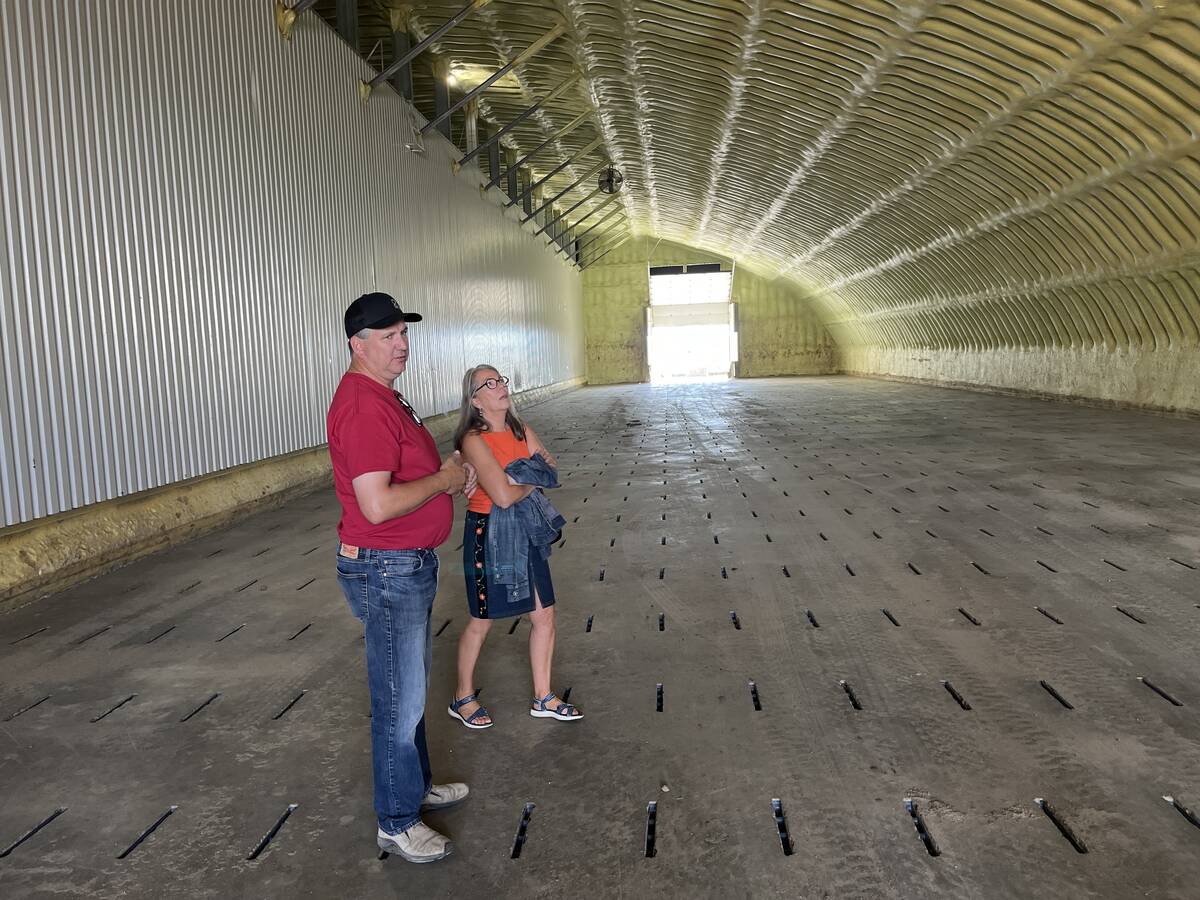BOW ISLAND, Alta. – For the Sereda family of Bow Island, Alta., 4-H is not just an hour-a-week commitment. It is a lifestyle choice that extends from the father to the youngest son.
“I’ve been in 4-H training for nine years,” said 11-year-old Nevin Sereda. As a baby, his parents Peter and Lori packed him in his car seat along with his three older brothers to attend meetings, shows and other 4-H gatherings.
“It’s a partnership with both of us together and our family does everything together,” said Lori.
Read Also

Potato farm requires year-round management
The most recent Open Farm Day in Alberta showcased agricultural producers across the province educating the general public about the process that is required is to get food to their table.
They were recognized earlier this year in Montreal at the national level for their outstanding leadership within the 4-H movement. Nominated by their club, they were flattered by the recognition.
“We had absolutely no idea these kids got together and had written up a nomination form,” said Peter.
As a couple, their first date was a Lethbridge 4-H show and sale in the morning and lunch afterward.
Peter joined the movement as a 10-year-old, first generation Ukrainian-Canadian tagging along with the neighbours. He became completely immersed in the program and when he and Lori married, she became a leader when their oldest son, Nicholas, was ready to join.
The boys, Nicholas, 18, Nathan, 15, Nolan, 13 and Nevin, 11, joined as soon as they were eligible.
“We’ve looked at other youth programs for our own kids and we tried to find something that does a really good, all encompassing job,” said Peter. For them, 4-H won out.
“We want to see our kids have leadership training and life skills,” he said. All four boys are lively, but polite and articulate.
“Life skills stay with you forever. Those are the things that benefit you no matter what endeavour you pursue,” he said.
Peter and Lori believed new members should be offered projects beyond livestock. Not all rural children want to work with animals but they do want to learn new skills and gain life experience.
“Kids and parents are looking for some kind of a program. They need the discipline,” Peter said.
“It is our job as adults to give it to them. They don’t have to sit in front of the TV or spray paint fences,” said Lori.
They decided to form the first multi-club in the Lethbridge area with 18 enthusiastic young people amidst some skepticism among other leaders supervising livestock clubs.
They worked on photography, scrapbooking, cooking, computers, mechanics and woodworking. They also introduced the children to achievement days to show off their accomplishments.
Their style of leadership is to provide a helping hand and let the kids decide their own direction and projects.
When they are not working on 4-H, they have to make a living. Until a year and a half ago they farmed at Shaughnessy, north of Lethbridge. This is a highly intensive livestock community and family members were starting to develop health problems that they linked to the dust and other pollutants from nearby feedlots.
They looked for a new farm and settled on a fully developed property near Bow Island with 23/4 sections of dryland grain. Since they moved, timely rains have produced bountiful grain and pea crops.
On the side, Peter has a grain hauling business and Lori is a teacher assistant at one of Bow Island’s four schools.
Of course, 4-H moved with them and they started another multi-project club with 12 members the first year. Also during the move, they commuted back to Lethbridge to wind up affairs with their former club.
“We just about didn’t move because of our 4-H commitments,” said Lori.
They offered the same choices to their new club but insisted members follow some of the basic precepts of 4-H, which include developing leadership, running meetings, understanding the pledge, keeping records and public speaking.
They are convinced alumni 4-H members stand above the crowd no matter what profession they choose. They also feel it helped their oldest son make a career choice. Nicholas is an apprentice agriculture mechanic and started working with small engines as a 4-H member.
While 4-H is important to them, they see membership numbers dropping even in Alberta, which has the largest Canadian contingent of 7,000 youth and 400 leaders.
When Peter started as a child, his club had 30 members but today that would be unusual. It is getting harder to attract young people who have so many other recreational choices.
They want people to know Alberta offers about 50 different projects but a keen leader can take a group beyond that.
The movement is also a major volunteer commitment and finding dedicated leaders is always a challenge. Training is provided and networking meetings are offered but the Seredas worry some leaders are set in their ways and do not move with the times, so potential members lose interest.
It all comes down to understanding the youth.
“You have to talk to the kids and find out what their needs are and find out what their train of thought is,” said Lori.
“We can’t lead them effectively if we don’t know what they want,” she said.
To gain members, Peter would like to integrate with sports programs or start field crop projects that would mean a year round commitment. Another idea is working with Habitat for Humanity to build homes.
While there are numerous committed leaders like the Seredas, 4-H receives varying levels of public support. In Alberta, the program is 90 years old and until the early 1990s, Alberta Agriculture’s district home economists provided help in every community. Those positions were lost in government cutbacks and have been replaced with a specialist in each of the seven provincial regions.
As for this family, 4-H remains the family glue. Once their own children have completed the program, the couple hopes to continue as leaders, “if the kids want us,” said Lori.

















